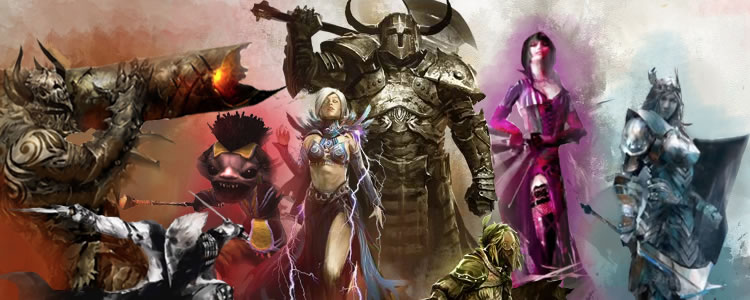The true heart and essence of Guild Wars 2 lies in its map.
It took me three weeks of playing and a chat with my colleague Kirk to realize and articulate how much magic lies in that seemingly simple function. The map of Tyria isn't just utilitarian; it's beautiful. Even mired in the fog of war, the painterly brush strokes hint at all manner of terrain to explore underneath.
But it's more than just the art. Where every other MMORPG I've played directs my attention inward, to a personal quest journal or log, GW2 directs my attention outward, explicitly asking me to take a more global view. Every quest I can complete appears on the map, from the permanent, static heart quests to the mobile, dynamic events. Vista points, seen and unseen, show on the map, as do points of interest and places where I can earn skill points. Perhaps most importantly, downed players---whether or not they are in my guild or group---appear on the map as well.
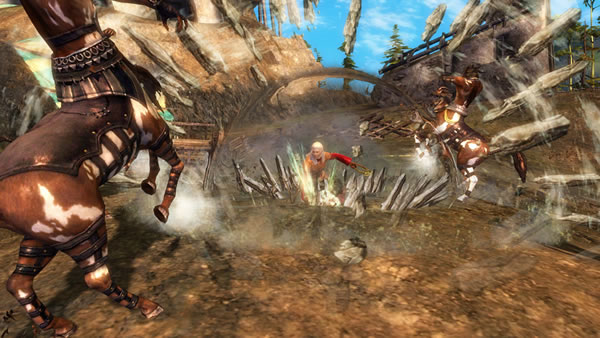
Guild Wars 2's map isn't just a record of where I have been; it's a living guide to all the places I have yet to go and all the things I have yet to do.

Guild Wars 2
Developer: ArenaNet
Platforms: PC
Released: August 28
Type of game: Fantasy-set MMORPG
What I played: A month on a main that reached the high 30s, plus some time on a few alts. Played as a member of a guild, with solo, group, dungeon, and PvP play, plus crafting.
My Two Favorite Things
- Design that explicitly encourages cooperation and community among all of the players loose in the world
- The art, not just in the game zones but also on the map and in cut-scenes and loading screens. It's vivid, lush, and lovely, with a sense of human hands behind it.
My Two Least-Favorite Things
- Falling damage. With so many jumping puzzles and high vista views, an unfortunate series of splats is almost a certainty for any player. Even with ways to mitigate the damage over time, it's tiresome.
- Uneven performance. I can't explore the Black Citadel, because my framerate drops into single digits. All other zones I have encountered in the game so far are fine. It's frustrating.
Made-to-Order Back-of-Box Quotes
- "900 screenshots isn't too many, right?" - Kate Cox, Kotaku.com
- "A multiplayer game where hell isn't actually other people." - Kate Cox, Kotaku.com
During a full month playing Guild Wars 2, I recorded impressions in a series of logs. The first was where I discovered an insatiable need to explore. In the second, I marveled at how easy it was to get off the beaten path, how unnecessary it seemed to be to form a party, and how generally amiable the community was. Part three was where I discovered crafting, and in log four I hopped into world vs world PvP and fell off rather a lot of cliffs.
The constant thread running through all my experiences was how truly impressed I remain with the very deliberate tactics ArenaNet has taken to try to break players of the habit of a personal, linear ladder that so many previous MMORPGs have instilled in us. Other games have taught me to view other players as competition, or as danger. If another player and I arrived on a dock in EverQuest II at the same time, we'd make a point of steering in opposite directions from each other as we ran into the zone, to avoid getting in each other's way with harvests or kills. A recent foray into World of Warcraft has left me feeling that other players are something I have to wade through to get where I'm going. In these, and in nearly other multiplayer game I've ever tried, the existence of other players only helps me when I am intentionally in a group with them.
Not so in Guild Wars 2. Every event that shows up in or near my path is a moment that inspires a silent but fervent hope from me that there are other players around. Diving into a massive melee is fun; finding myself all alone, with a half-dozen waves of enemies bearing down on me, is not. And yet becoming overwhelmed at an event isn't the end of the world, even it if it is briefly the end a character's life. (Death, fortunately, is but a fleeting and easily remedied condition.) Zones are set up in a state of perpetual warfare: if players cannot defend a location, well then they can help retake it later. After pirates managed to blow up one bridge, a new wave of players came by, helped resurrect me and the other player that had been standing on the bridge when it blew, and then we all worked together to defend the workers repairing it.
That spirit of perpetual cooperation in a living, breathing world is truly what sets Guild Wars 2 apart. The generally joyful, cooperative feeling is enhanced by the way the game measures progression. There are eighty levels, fairly standard, but every action a player takes contributes to a single bar of experience. Crafting, exploration, combat, questing, event participation, even throwing a rez on another player---every action contributes to growth. Nor are skills entirely dependent on a player's level. Hotbar slots do unlock at levels 10, 20, and 30, and players can fill those slots with powerful skills.
Weapon skills, though, are based entirely on the weapons a player has chosen to equip. If I fight with a dagger in each hand, I will learn a certain five skills. If I swap the main hand dagger for a gun, I'll learn three new skills for slots 1-3 in lieu of the dagger skills I had there. If I swap the off-hand dagger for a gun, slots 4 and 5 change. It's a modular system that sounds complex but that becomes intuitive and fluid almost instantly on playing.
Over the past few years, there has been a trend in massively multiplayer online games that has seen them become ever more single-player experiences that take place in a shared world. Guild Wars 2 reverses the trend handily, without ever once prescribing particular "social" actions for its players. No player must participate in a group event, and swooping by to rez a fallen player or lending a hand in any fight you run by are entirely optional acts. And yet, the way the game is arranged, players do tend to stop to help each other out.
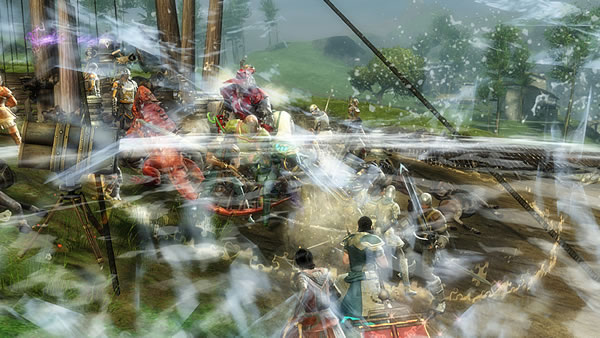
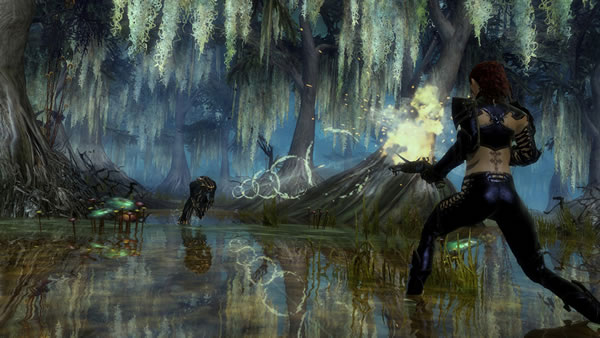
The end result is a game that feels a bit like Cheers. Everyone may not exactly know your name, or be glad that you personally came, but it's still a world that welcomes your presence. Tyria can be difficult to navigate at times, but in a way that feels playful and mischievous rather than hostile. Above all, Guild Wars 2 feels encouraging and fair. Death and failure are not particularly difficult to overcome, and become challenges rather than punishments.
If I get lost by stepping off the beaten path, there will always be another path to find.
If I get lost by stepping off the beaten path, there will always be another path to find. If I die falling off a high vantage point, it will have been my own fault for climbing up there to begin with. If I am severely under-leveled for an area, it's because I chose to ignore the level guidance prominently displayed on my map. When I get in over my head with a bunch of adds, I will almost always have had adequate warning that the area was dangerous. With waypoints scattered fairly liberally around most areas, reviving at one and making my way back to where I was usually doesn't set me back all that far.
Guild Wars 2 is likewise forgiving in its dungeon environments, for which I found myself very grateful on my first foray into the Ascalonian Catacombs. It's the first group zone in the game, and yet it doesn't appear until a player is roughly level 30. Events in the player's character story lead to it, and allow the player to enter in story mode. After, players can return to explore the dungeon in a more traditional exploration mode.
While the dungeon itself is a fairly straightforward and predictable mix of trash mobs and bosses, laid out in an easy shape, learning how to approach one for the first time with GW2's particular mix of class skills can be an adventure of the repeatedly fatal kind. Additionally, the more players are casting in a particular area, the harder it is to spot the warning signs of AOE effects or traps about to splash fire, spikes, or another variety of pain on your location. Though the problem of visual spectacle overwhelming useful information is hardly limited to dungeons alone.
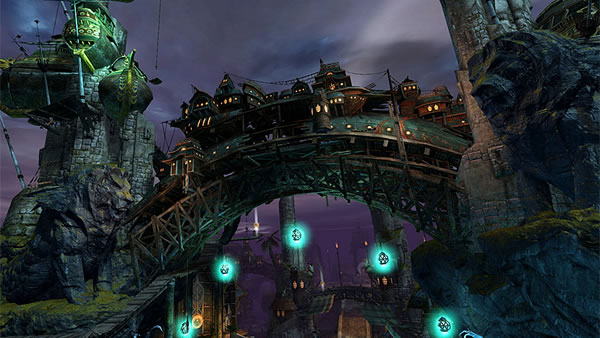
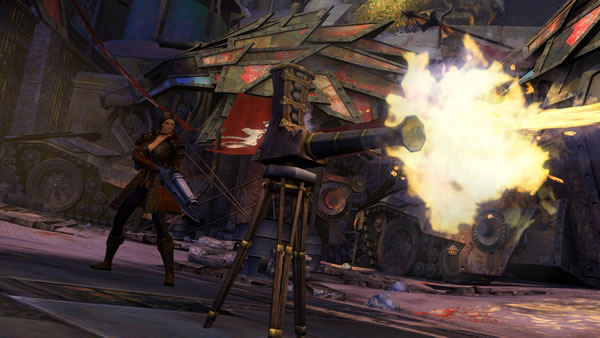
What I feel as I play Guild Wars 2 is something I have not felt in this kind of game in a very long time. In it, I am not just a player who happens to be moving through a game that other players also enjoy. Instead, I am part of a community and part of a world that constantly reacts to my presence in it---even if some of those reactions are clearly on a loop. My urge to explore just for the sake of finding things is not only tolerated, but encouraged and for once, I am relishing the part of "massively multiplayer" that brings other players to my side.
Guild Wars 2 is not structured as a deeply competitive game, and players who strive only for the best gear, the fastest leveling, and the sharpest end-game technique will likely miss most of what it has to offer. Rather than seeing the absence of an end-game focused quest and gear ladder as a lack, though, I see it as a blessing. It is a journey that gives me great pleasure to explore.
As for the destination? I really have no idea where it all will end. But I will enjoy taking my time---and discovering every single point on every map---on the way there.
Republished with permission. Kate Cox is a contributing editor at Kotaku.
